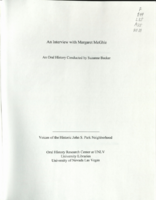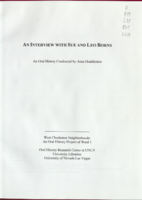Search the Special Collections and Archives Portal
Search Results

Gustavo Ramos Jr. interview, October 25, 2018: transcript
Date
Archival Collection
Description
Interviewed by Laurents Bañuelos-Benitez. Gustavo Ramos Junior was born in Presidio, Texas. Growing up Ramos described his childhood as simple childhood, typical of someone that was born on farmland. At the age 10, Ramos and his family moved to California in hopes of better opportunities. When they arrived in California the family had to live in public housing, despite his father not wanting to, he realized it was the only way his family could start anew. Living in public housing influenced Ramos for the rest of his life, including his career as director of public housing in three states.
Text

Valorie Vega interview, November 19, 2018: transcript
Date
Archival Collection
Description
Interviewed by Laurents Bañuelos-Benitez. Barbara Tabach also participates in the questioning. Valorie J Vega was born in raised in Los Angeles County. Her father, Fred Vega, was one of the first firefighters hired in the Los Angeles County area. Vega was one of three children, and remembers spending her childhood surrounded by family. In college, Vega began studying biology only to realize that she was better suited studying Spanish. Upon completion of her undergrad, Vega went on to earn a Master's in Spanish interpretation. As a result of her studies, Vega was able to secure a job in the Court Interpreter program in Las Vegas, moving here in 1978. Her position in the interpreter program, led her to pursue a degree in law which in turn led to a successful career as a lawyer and a judge.
Text

Jahaira Farias interview, April 12, 2019: transcript
Date
Archival Collection
Description
Interviewed by Monserrath Hernández and Barbara Tabach. Jahaira Farias is a graduate of Western High School, a Marine Corps veteran, and a founder of a local chapter of the Women Marines Association. At the time of this oral history, Jahaira worked for US Congresswoman Susie Lee. Jahaira Farias was born in Las Vegas, Nevada, and grew up on the west side of town. She has summertime memories of her travels to Mexico, where she was able to connect with her family's heritage and language. During her years at Western High School, she participated in varsity sports and was the armed drill team commander. After graduation, Jahaira enlisted into the Marine Corps, where she specialized as a transport operator and hazardous material transporter and served two deployments in Iraq and Afghanistan. Her transition to civilian life included work in security at Caesars Palace. When she took a position with as district representative for Congresswoman Susie Lee, her focus was to assist veterans and immigrants. She helped Rep. Lee develop community outreach towards the Latinx community and Veterans. Jahaira is the president of the Las Vegas NV-3 Sagebrush Marines chapter of the Women Marines Association, an organization she helped establish and rebuild. The WMA helps veterans find their footing again through mentoring and support, and conducts community engagement by fostering the same camaraderie found in the Corps. After surviving a motorcycle accident, Jahaira's recovery is nothing short of miraculous, going from being in a wheelchair to competing in Tough Mudder. Now extremely active, Jahaira is an avid hiker and certified yoga instructor, specializing in trauma recovery. A polyglot, Jahaira formally studied Arabic and Russian, and speaks English, Spanish, and Pashto, and received an associate degree in Russian from the College of Southern Nevada.
Text

Transcript of interview with Francis E. Hughes by Mark E. French, February 23, 1977
Date
Archival Collection
Description
On February 23, 1977, collector Mark E. French interviewed local farmer, Francis E. Hughes (born March 9th, 1917 in Mesquite, Nevada) in his home in Mesquite, Nevada. This interview offers an overview of the general lifestyle and culture in Mesquite. Mr. Hughes mother, Orilla Leavitt, was born in Bunkerville, Nevada. Members of Mr. Hughes’s family were amongst the first settlers in the Mesquite area.
Text

Floyd Jenne interview, 1996: transcript
Date
Archival Collection
Description
Jenne discusses his birth in Ogden, Utah in 1915, his early life in Northern Nevada in 1920s, and his later life in Boulder City, Nevada working as a reclamation ranger for the Bureau of Reclamation. Jenne begins the interviews discussing his work as a steel foundry worker and miner in McGill, Nevada, studying forestry, and enlisting in the Civilian Conservation Corps at Utah State University in 1934. Jenne then describes his experiences moving to Boulder City and working as a reclamation ranger. Other topics Jenne covers include providing security for notable Boulder City and Hoover Dam (Boulder Dam) visitors and patrolling the area. Lastly, Jeanne talks about the Boulder City Junior Chamber of Commerce, Boulder City's incorporation, and Boulder City law enforcement.
Text

Transcript of interview with Phyllis Webb Clark by Lorna Suzette Clark, April 7, 1976
Date
Archival Collection
Description
On April 7, 1976, Lorna Suzette Clark interviewed her mother-in-law, Phyllis Webb Clark (born 1928 in Los Angeles, California) about her experiences from living in Las Vegas. The two first discuss education, the various address at which Phyllis lived, and the early development of the Strip and Downtown areas. The interview then covers the visits of important individuals, forms of transportation, the effect of World War II on the economy, and the effects of the growing town on hospitality and courteousness. Phyllis also mentions the Helldorado Parade, her involvement in Boy Scouts and Girl Scouts, and recreational activities. The interview concludes with a discussion on the atomic testing, the Stewart Ranch, and floods in Las Vegas.
Text

Transcript of interview with Margaret McGhie by Suzanne Becker, November 21, 2008
Date
Archival Collection
Description
Margaret McGhie was a Depression era child who grew up in western Nevada, where her grandparents were ranchers. Her mother, a native Nevadan, married an Italian immigrant, and she recalls moving a lot. Margaret attended a business college in Reno and eventually moved to Las Vegas, where she worked for Basic Magnesium (BMI) in Gabbs, NV and then later for a remanufacturing company where she verified rocket measurements. Only 16,000 people resided in Las Vegas in post World War II days when she moved there for work as her husband returned from military service. At the time lots for homes were selling in the new development of John S. Park. Using the GI bill the young couple became one of the first home owners on the street. The land had formerly been a ranch and orchard making it a beautiful spot. Due to post-war building material shortages it took nearly two years to finish the house construction. To this day Margaret lives in the home where she and husband raised four children. She recalls the neighborhood fondly and describes some of the activities that kept them busy, where they shopped, and how her children attended John S. Park Elementary School and then the local parochial schools. She describes how the town changed from a 10-minute cross-town drive and how the fact of living close to the Strip had little impact on their life. People moved from the neighborhood as the city grew, she says, moving to newer and nicer homes in Spanish Oaks and then Summerlin. The John S. Park neighborhood has changed from a formerly large Mormon demographic to a notable increase of Latino population. She sees the historic designation as a signal of pride in ownership for residents.
Text

Transcript of interview with Leo Borns and Sue Easley Borns by Anna Huddleston, March 21, 2014
Date
Archival Collection
Description
Leo and Sue (Easley) Borns came to Las Vegas in 1962 to begin an architectural career that would last forty-four years in Southern Nevada. Leo Boms worked for various firms in Las Vegas before developing a reputation as "F. Borns, Architect". He has gone on to design buildings for state public works, Clark County, the City of Las Vegas, Clark County School District, churches, and private home owners. Rarely taking a job outside of Southern Nevada, Leo Boms' intent was to develop an architecture considered indigenous to the area while keeping the conservation of energy and technology as prime importance. Mr. and Mrs. Boms, after living in the area for approximately five years, decided to purchase a home on Strong Drive in McNeil Estates where they raised their three children. Active in social and philanthropic organizations, both Leo and Sue have become acquainted with numerous area personalities. Mr. Boms is most proud of being a part of the development of the Kiwanis Water Conservation Park although his structural designs can be seen throughout the Southern Nevada area. At the age of 77, he closed his office but remains an integral influence on the Greater Las Vegas area.
Text

Transcript of interview with Dennis Ortwein by Claytee White, May 6, 2009
Date
Archival Collection
Description
Dennis Ortwein arrived in Las Vegas in 1956. He shares many details about growing up in Montana, his parents and siblings, his education, and the moment in time when he was offered an opportunity to work in Las Vegas. He also lays out the path his singing career took, starting with school plays, duets with his sister, and high school quartets. Once in Las Vegas, Dennis taught for a while, served as principal, and was involved in creating programs that helped integrate schools. He also talks about his church choir work, entertainment in early Las Vegas, above-ground testing at the Nevada Test Site, and anti-nuclear protests. Dennis served as lab school and student teaching coordinator in Nigeria. He offers several anecdotes and stories about the time he and his family spent there. After retiring early (age 53), Dennis acted as consultant to the Esmeralda County school board, executive director for the National Conference of Christians and Jews, and wrote a book. He is currently enjoying his singing career by appearing at conventions, in musicals, and at weddings and memorials.
Text

Transcript of interview with Charlene Herst by Barbara Tabach, September 09, 2016
Date
Archival Collection
Description
In 2014, Charlene, n?e Friedkin, Herst retired from her state government career, settled into volunteer work, being a mother and grandmother, and being a grant writer for others. After thirteen years in Carson City, she came back home to Las Vegas. Charlene was eight years old when her parents, Patricia and Richard Friedkin, moved their family to Las Vegas from northern California. She remembers vividly the hot day that they arrived and moved into a rental house in the desert across from Woodlawn Cemetery. Her father, formerly in the grocery business, found work at Vegas Village. Two years later they moved ?into Las Vegas at the very edge?which was Oakey.? She recalls people she has known since those first years who have been instrumental in the growth of Las Vegas; the challenges of being a divorced single mother of four; and the career path that began with an invitation from Gene Greenberg to apply for a part time position at Channel 3, where he was sales manager. At Channel 3 she quickly went from part time to full-time. She started the Community Projects Board, which brought together nonprofit organizations together at the studio in the 1980s to identify and develop marketing campaigns that addressed social issues in the community. Initiatives included Baby Your Baby and Smoking Stinks. While working for Channel 3, she also attended UNLV and received a communications degree in 1995. In 1997 she worked at Sierra Health Services in public relations. Then in October 2001, Charlene started her career in state government as the Nevada State Health Division?s Manager of the Tobacco Program. Over the course of her thirteen year career with the state, she was promoted to positions that continued her dedication to improving the quality of life of all Nevadans. She was instrumental in the implementation of the Nevada Clean Indoor Air Act (2006); improving prevention services to women; reducing the rate of substance use and abuse in the state. The date of her retirement, October 10, 2014, was officially proclaimed in honor of Charlene Herst by Governor Brian Sandoval.
Text
